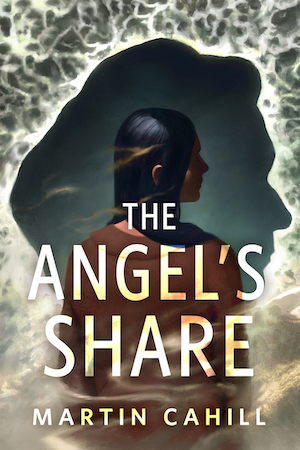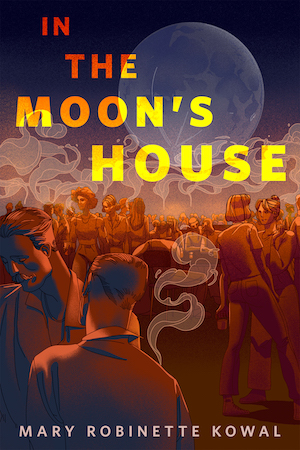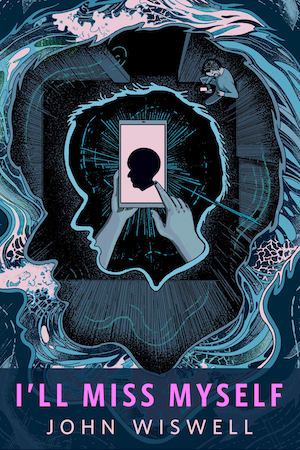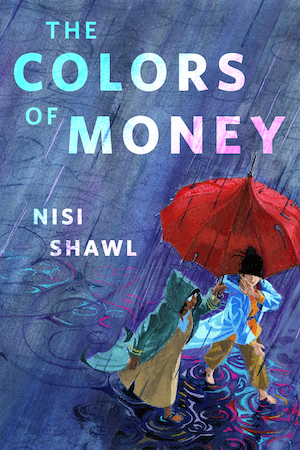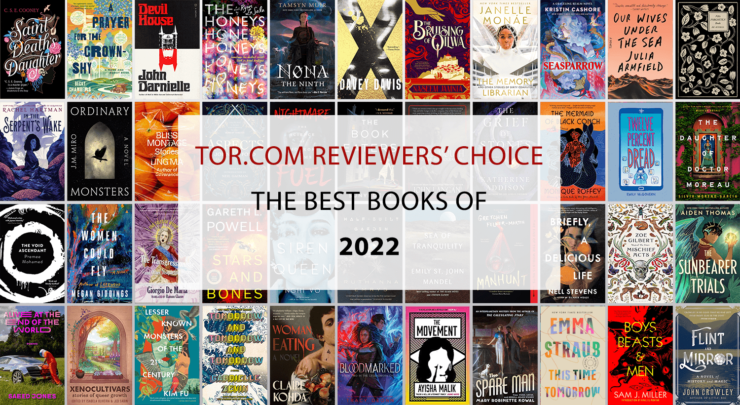Every year we’re blown away by the consistently amazing book releases in the genres of science fiction, fantasy, young adult, and beyond—and 2022 raised the bar even further. Our reviewers each picked their top contenders for the best books of the year, ranging from glittering alternate history to meditative hopepunk, and elegiac science fiction to apocalyptic horror. We’ve got blood magicians, multiverse prophets, elven detectives, and much more.
Below, Tor.com’s regular book reviewers talk about notable titles they read in 2022—leave your own additions in the comments!
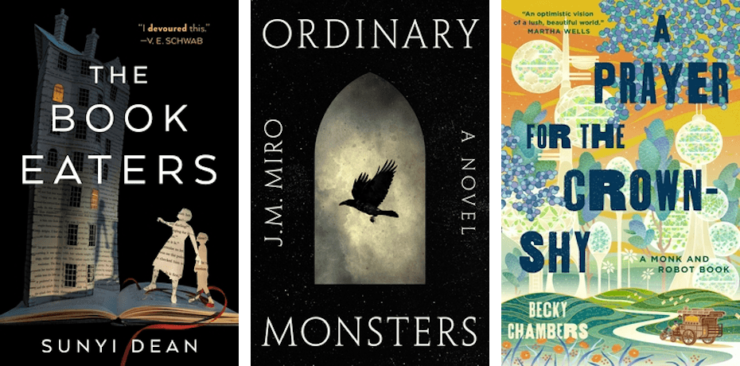
I was really drawn in by Sunyi Dean’s The Book Eaters. I wasn’t sure what to expect when I picked it up. It’s a story with an interesting premise—it centers around a group of people who eat books (or brains) and absorb the information (or memories) within—and uses that as a jumping-off point to delve into issues like motherhood and misogyny, and it stuck with me long after reading.
Ordinary Monsters was another book that lingered after I turned the last page. It wasn’t a light read (or a short one at 672 pages) but it created such a darkly rich 19th century world.
And of course, Becky Chambers’ second Monk & Robot novella, A Prayer for the Crown-Shy, was unsurprisingly another one of my favorite reads. Chambers books help me when my heart hurts, and I cannot wait for the next in the series.
–Vanessa Armstrong
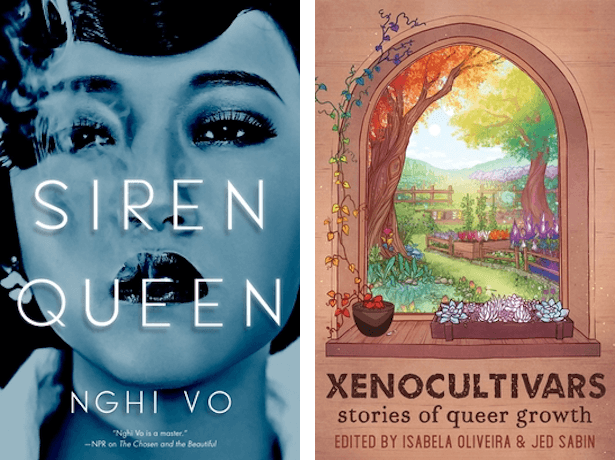
There has been so much good speculative fiction this year that I could take up this entire column listing things. To keep this from getting too unwieldy, I’ll save my young adult pick for my Best of 2022 wrap up and keep this to my favorite adult SFF/H, anthologies, and short fiction.
First up, Siren Queen by Nghi Vo. Historical fantasy set in the early Hollywood era? Immediate yes, immediate yes. Not only is this novel rich with historical treats that film geeks like me will freak out over, but it’s also just gorgeously written. The narrative is lush, the characters vivid and unique, the plot wholly compelling. It’s the kind of novel I wish I could read again for the first time to experience that sense of awe once more.
I read many killer anthologies and short story collections this year, but Xenocultivars: Stories of Queer Growth edited by Jed Sabin and Isabela Oliveira is the one that has stuck to my soul like glue. This was a fantastic year for stories of queer joy and empowerment, and maybe it’s because I read this on the heels of my first viewing of Our Flag Means Death but it just made me feel so warm and welcome.
Speaking of stories that leave you feeling your feelings in a big way, let me sing the praises of “E.I.” by Kola Heyward-Rotimi. Reckoning is one of those speculative fiction magazines that I get genuinely excited to read because the kind of stories they publish are always some concept or execution I’ve never seen before. This story is a quiet slice-of-life piece set in the future where a soil delegate in Appalachia goes about her job. It’s lovely and personal.
Shout outs to: Wayward by Chuck Wendig, The Bruising of Qilwa by Naseem Jamnia, “Clay” by Isabel J. Kim, “D.I.Y.” by John Wiswell, “In the Smile Place” by Tobi Ogundiran, Trouble the Waters: Tales from the Deep Blue edited by Sheree Renée Thomas, Pan Morigan, & Troy L. Wiggins, Voodoonauts Present: (Re)Living Mythology edited by Shingai Kagunda, H.D. Hunter, Yvette Lisa Ndlovu, LP Kindred, and We Won’t Be Here Tomorrow: and Other Stories by Margaret Killjoy. I see you, I love you, you’re great.
–Alex Brown
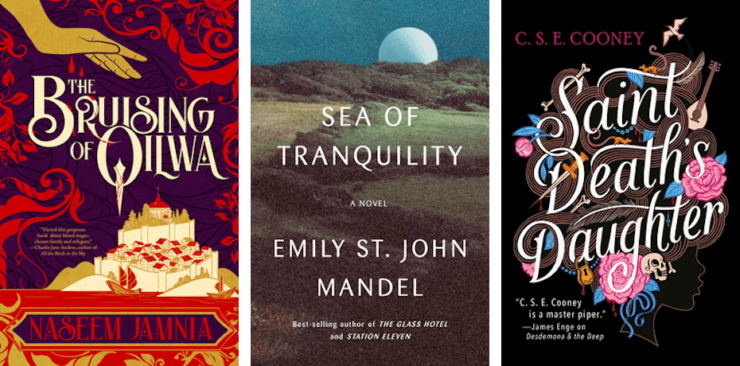
As I’ve said in the past, picking just three novels for a list of favorites is still impossible, so I will continue to cheat as much as I can. Some stand-out titles from this year include: The Genesis of Misery by Neon Yang, Last Exit by Max Gladstone, This Time Tomorrow by Emma Straub, Siren Queen by Nghi Vo, Where I Can’t Follow by Ashley Blooms, Leech by Hiron Ennes, and The Cartographers by Peng Shepherd. Also, very briefly, a handful of short stories and poems that utterly wrecked me: “Miracle Babies,” by Roshani Chokshi, “How To Abandon Your Sourdough Starter,” by Theresa DeLucci, “The Long Way Up,” by Alix Harrow, “That Story Isn’t The Story,” by John Wiswell, and “Of The Body,” by Eugenia Triantafyllou. My top three novel picks were each novels that built a fire in my heart and warmed me throughout a truly wild year.
The Bruising of Qilwa by Naseem Jamnia: A novella debut that knocked my socks off, both of which I’ve been unable to find since. A slim, but dense, story of a nonbinary blood magician doing their best to thread the needle between hiding their abilities due to prejudice in a divided country and using them to save countless citizens afflicted by a mysterious plague. This breathtaking novella only cements Jamnia as a writer on the rise, and I was awed page after page by their talent for propulsive and immersive epic fantasy done in their unique and beautiful voice.
Sea of Tranquility by Emily St. John Mandel: Mandel’s newest was my first book of the year and it set an incredibly high bar. The beloved author of Station Eleven brings her own bittersweet, nuanced perspective on time travel, moon colonies, and other signature sci-fi tropes, while populating the strange and otherworldly with very human, very real, complex and fucked-up people trying to survive, make art, and love in times of extraordinary crisis. Another win from one of my favorites.
Saint Death’s Daughter by C. S. E. Cooney: Ye gods, what a debut! If you haven’t had the pleasure of reading any work by C. S. E. Cooney, she is truly a master at work that makes you feel. At prose that shimmers and pops in your sinuses like champagne bubbles, at characters that toss you this way and that like a boat within the grip of a happy storm, at worlds rich with detail and meaning and heart. This charming, intricate story of a young necromancer allergic to violence has easily entered the top twenty books of my soul and I will gladly tell everyone to read it.
–Martin Cahill
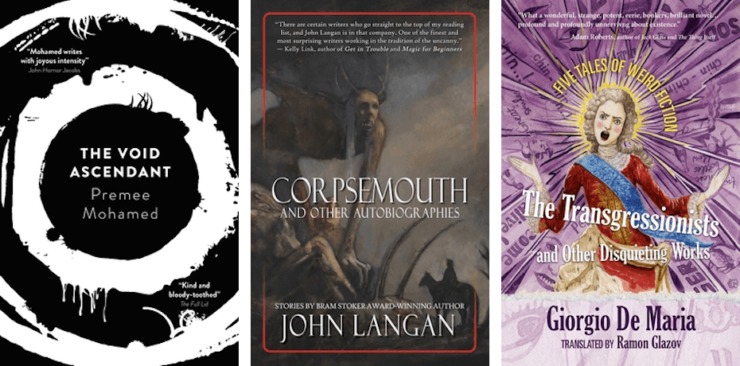
I’ve been thinking a lot about storytelling this year. Some of that’s been the natural result of working on a novel with a few nested narratives within the larger structure—and thinking about the peculiar conditions of making a shorter story work both on its own and within a larger context. But there’s also the larger category of stories about storytelling—and, within that category, stories that subtly critique storytelling.
Premee Mohamed’s The Void Ascendant—which brings her Beneath the Rising trilogy to its conclusion—is a prime example of how to do this well. The first volume reads like a cosmic horror-fueled counterpart to Nick Harkaway’s The Gone-Away World, but in succeeding volumes Mohamed goes on to ponder questions of race and class within the pulp-adventure framework she’s set up—and then goes on to, in the final volume, ask big questions about justice and reconciliation. It’s staggeringly great stuff.
When it comes to formal innovation and nested narratives, few writers do it better than John Langan, and this year brought with it a new collection of his work—Corpsemouth and Other Autobiographies. I’d been eager to read this for a while—the novella “Corpsemouth” was the first work of his I’d encountered, and remains a stunning work of fiction—but what I was taken with were the ways in which Langan pushed himself into new places with the works within this volume.
Another long-awaited—for me, anyway—volume was the late Giorgio De Maria’s The Transgressionists and Other Disquieting Works, translated by Ramon Glazov. His The Twenty Days of Turin is still seared into my mind and, while also in the uncanny vein, the works collected in this new volume show off a very different side of his work—including a haunting work about a secret society of psychics with a mysterious and disquieting set of goals.
–Tobias Carroll
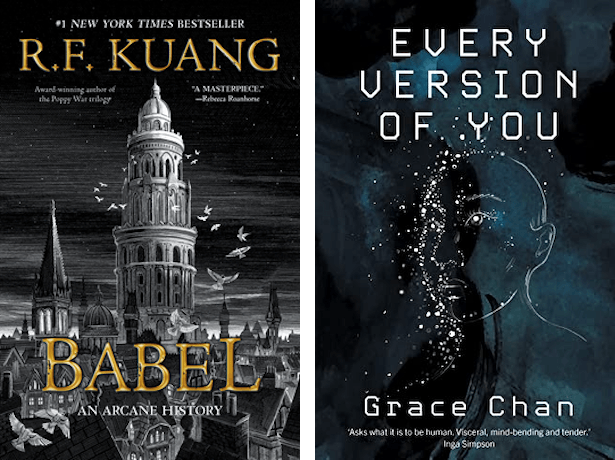
It’s satisfying to look back on my reading this year and find my favourites are so varied in terms of narrative and genre. Two books that stand out are as follows. Firstly, the alternative history Babel: Or the Necessity of Violence: An Arcane History of the Oxford Translators’ Revolution by R.F. Kuang, set in a world where Britain exploits languages and silver as the basis for its imperial conquests. Robin’s everyday marginalisation by Oxford and desperation for survival within is painfully resonant; subsequently, he struggles with the injustice inflicted by imperialism, and his own complicity. The revolution which ensues is reminiscent of Chinese history of student protests, and brings the narrative together to a memorable close.
Every Version of You by Grace Chan is a literary and science fiction novel set in a near-future Melbourne where people mostly exist within a virtual world. The protagonist Tao-Yi becomes increasingly alienated as her partner Navin becomes further drawn into the world of Gaia and its constructed perfection. The diaspora and migrant backstory underlying Tao-Yi’s identity and relationship with her mother shaped its particularly emotional moments, and the book is a stand-out examination of what one’s humanity is and how one can lose parts of ourselves that once seemed immutable.
–Wendy Chen
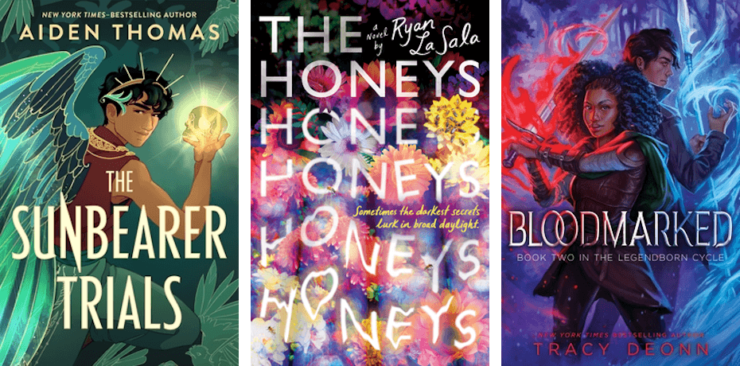
Aiden Thomas’ The Sunbearer Trials was a knockout for me. The richly imagined mythos, the deeply intentional Mexican-inspired worldbuilding, the queer and transnormativity—Thomas weaves all of it into a propulsive plot anchored by its magnetic, tenderly crafted characters. There’s so much joy within these pages. It’s a high-stakes magical adventure story that welcomes its readers with such compassion, especially transmasc and nonbinary readers of color, and it’s such a joy to behold. Can’t wait for the sequel!
The Honeys was another big hit—I expected to love it, but I couldn’t have expected the degree to which it squeezed my heart on just about every page. Within this sickly sweet and searing summer horror are thoroughly cathartic explorations of gender and grief. The nuances of passing and performance. The endless shift of self-discovery, in all its bright possibility and boundless sorrow. It’s a sharp read with wild swings and stings—my favorite yet from Ryan La Sala.
And okay, I haven’t quite finished it yet (it’s only been out a week as of my writing this, in my defense!) but based on Legendborn, the half I have read, and who I am as a person, I can’t not give a shoutout to Bloodmarked! Believe the hype about this series. Tracy Deonn is a wonder and a powerhouse. The Legendborn Cycle is a transformative masterpiece, alight with grief, rage, and so much love it nearly knocks the wind out of me. I haven’t even finished Bloodmarked yet and I already know it’s a favorite for the year (and for always). It’s just that goddamn good.
–Maya Gittelman
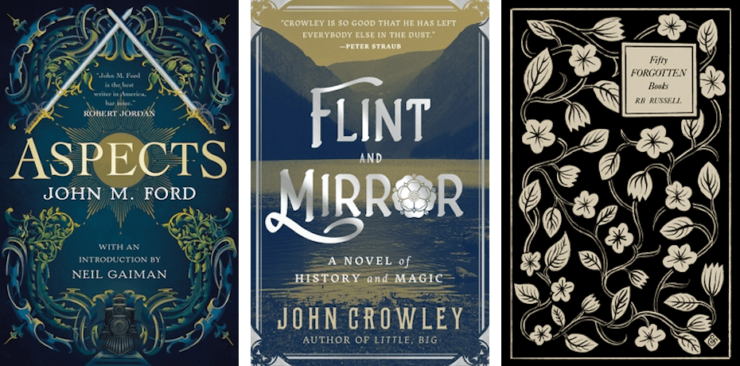
John M. Ford was writing Aspects at the time of death; the novel stops rather than ends. And yet it remains one of the best fantasy novels of the year: the quality of Ford’s prose, the depth of his characters, and the complexity of his world more than compensate for the unresolved plot.
John Crowley’s Flint and Mirror is short, dense, and elegiac. It appeared in the spring, but I can’t help but think it’s more appropriate for the end of the year. Flint and Mirror is a story of compromises, of failures, and of endings, but Crowley makes his story a joy to read.
Finally: A work of nonfiction. I am forever on the hunt for interesting, unusual, and obscure books, but most lists of “little-known” titles disappoint me. Earlier this year, for example, Barnes & Noble slapped “rediscovered classics” logos on The Talented Mr. Ripley and All the Pretty Horses, two novels that have sold millions. So I was pleased to find R. B. Russell’s Fifty Forgotten Books, a mix of memoir and criticism that lives up to its title. When I saw that the most familiar names in the index were Sylvia Townsend Warner, Arthur Machen, and Robert Aickman—all brilliant, all unfamiliar to most readers—I knew I was in good hands. I haven’t yet read this from cover to cover, but every entry I’ve flipped to so far has been a joy.
As ever, there are dozens of titles I could imagine making my list, if only I’d had the time to read them: The Seven Moons of Maali Almeida, Babel, The This, Expect Me Tomorrow, and How High We Go in the Dark all come to mind.
–Matthew Keeley
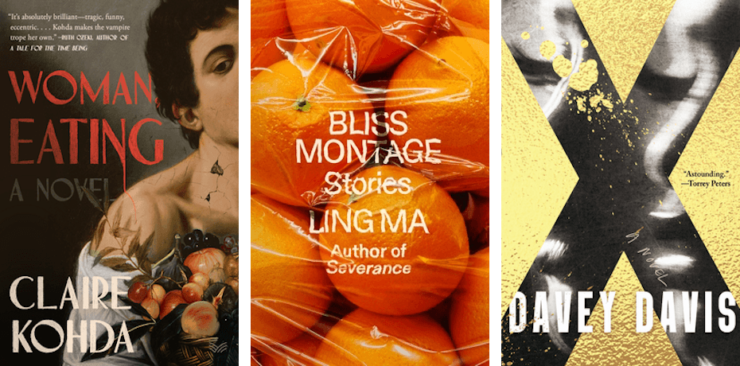
I sometimes joke that my beat at Tor.com is vampires and the end of the world. Which is true, and probably telling about what kind of person I am (nihilistic, melodramatic). But when really I delve into the ‘why’ of it all, perhaps I can say that I’m drawn to work that is interested in intensity; that while ethically ambivalent, still has some precarious, vital force. In this time of late-capitalist depravity, I want books that don’t just search for what’s redeemable from within the detritus of our collapsing civilization, but rather find pleasure in its surreal contradictions. That excavate the pitfalls of power and agency as we scramble for it, both individually and collectively. That fantasize beyond lazy cliches of apocalypse and doom.
Lucky for me then, that 2022 was a stellar year for such titles! Claire Kohda’s Woman, Eating is a tautly written vampire novel that excavates the tension between youthful individuation and generational inheritance, using vivid lineages of sense memory—of blood and food and colony—to forge a path to life and art that isn’t necessarily politic, but feels uniquely owned.
Ling Ma’s Bliss Montage is a series of short stories that plunge the reader directly into bizarre scenarios, peppered with disillusioned protagonists who struggle to understand their desires. Rather than experience these with urgency, these characters instead blandly observe their longings—symptoms of invisible structural powers, now so sublimated that they might as well be a vase of dried flowers.
And I would be remiss not to mention Davey Davis’ gently speculative novel, X, a hardboiled, red-hot S/M escapade that contains a perversity of art and politics that reflects the sweet threat of shared queer life without neutralizing the barbs. That enacts the pleasure and futility of trying to inhabit and inhibit the world’s capitalist, carceral or identifiable logics. I’m so grateful to these books for making me both question as well as feel. I look forward to more of this kind of literature, that feels harnessed from the brute complexity, the stacked deck of our having to even exist.
–Trisha Low
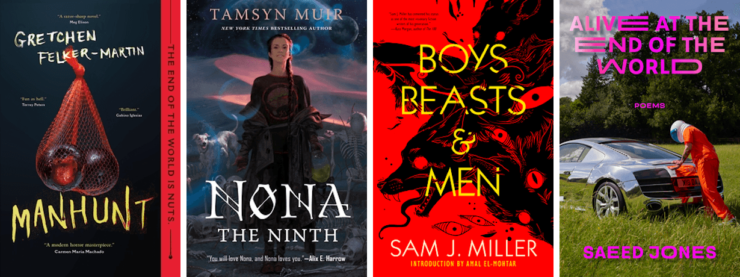
Selecting a tiny handful of books to represent the year’s reading always throws me for a loop, but this time around, there were some obvious stand-outs. Gretchen Felker-Martin’s Manhunt, a gender apocalypse horror novel from a trans perspective, started me off right back in February. At times a difficult read (naturally!), Manhunt is a fresh, gruesome, and somehow-ultimately-hopeful spin on an otherwise exhausted trope.
Also, the third installment in Tamsyn Muir’s Locked Tomb series, Nona the Ninth, knocked me on my ass this fall—in ways both anticipated and not—but that’s probably no surprise.
In the realm of short fiction Boys, Beasts, & Men by Sam J. Miller was released over the summer season: a long-anticipated first collection! The stories inside “weave together two fictional lineages: the tradition of political queer sf, and the tradition of weird gay art,” to powerful and provocative ends.
For another book dealing beautifully with queer survival—as well as race and cultural consumption in America—Saeed Jones’ newest poetry collection Alive at the End of the World hits my list too. These sharp, funny, passionate, and handsomely crafted poems are exactly the kind of thing I needed to get through these next few months.
And lastly, the nonfiction books I reference in the above reviews round out the list—Let the Record Show: A Political History of ACT-UP New York by Sarah Schulman and Hold it Against Me: Difficulty and Emotion in Contemporary Art by Jennifer Doyle. Though neither was originally published this year, both speak to our present political and cultural situation as treatises on how important complexity, nuance, and discomfort are in forming solid ethics around activism and art alike.
–Lee Mandelo
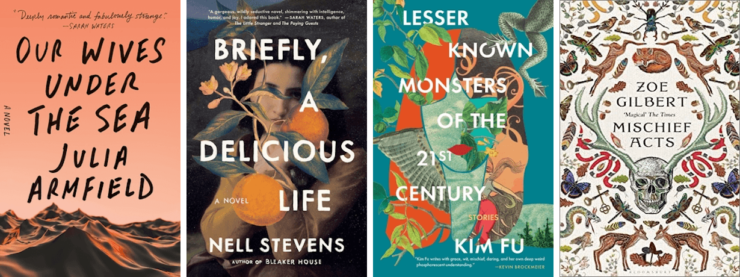
I didn’t do a lot of timely reading in 2022, but this year turned out to be a banner one for haunted and/or monstrous lesbians—great news for madwomen in attics (i.e., all of us at this point in the pandemic) everywhere!
Julia Armfield’s damp gothic stunner Our Wives Under the Sea (which I also reviewed at length) stands out as one of my favorites of this (and any other) year. It’s a funny, wise, and often devastating exploration of what happens when your best-beloved is slowly turning into a sea monster (spoiler: nothing good). Don’t read it while eating lunch if you’re squeamish.
Nell Stevens’ Briefly, A Delicious Life stars a precocious and extremely horny centuries-old teenage ghost who spends One Fateful Summer falling madly in love with George Sand. The problem: the object of her affections does not see her, literally. Gossipy, hilarious, and romantic, it will appeal mightily to fans of Emily Danforth’s Plain Bad Heroines.
Kim Fu’s stellar short story collection Lesser Known Monsters of the 21st Century is a witty, sinister bestiary bursting with creepy children, haunted dolls, and ruinous technologies. Fu is a master mixer of the speculative, the witchy, and the real.
I’m a huge fan of Zoe Gilbert’s novel(ish)-in-stories Folk, and her equally genre-defying follow-up Mischief Acts is just as wonderfully weird and exuberant. Following the “rascally psychopomp” and occasional British folk god Herne the Hunter from the the fourteenth century to the nightmarish twenty-first, it’s sort of a polyvocal The Dark Is Rising for grown-ups.
–Sarah McCarry
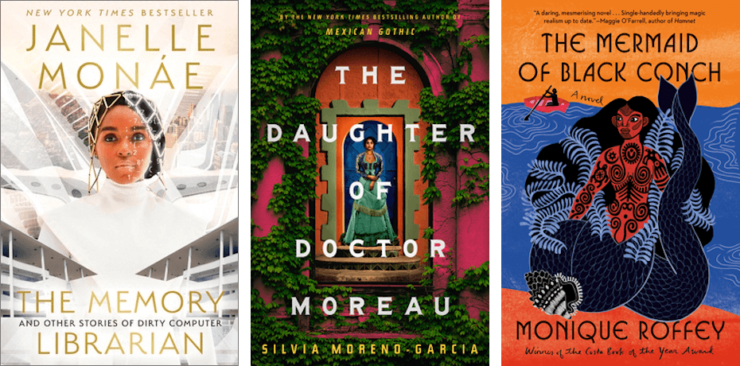
Musical artist and storyteller Janelle Monáe’s debut collection of stories, The Memory Librarian, is a collaborative anthology that expands on the existing SF elements created for her 2018 album Dirty Computer. This electric short story cycle spins off on the narratives of New Dawn, a totalitarian state where conformity is the only way to survive. Characters Monae introduced in the earlier ’emotion picture’ that accompanied Dirty Computer reappear here, in more detail and with greater depth, as they try to navigate life in a world where the system wants them erased and reprogrammed. But their memories of who they really are, of the power their ancestors have held will save them. Monáe is clear in her mind, and in each of these stories, that our identities and histories can not be erased, that the very art of storytelling is what will help build a future for those who are marginalized.
For a long time the idea of the woman scorned in Caribbean Literature came from Jean Rhys’ Wide Sargasso Sea, and while that was a powerful narrative, Monique Roffey has chosen to challenge it, and explore a different aspect of this in her award winning novel The Mermaid of Black Conch. While it is about an actual mermaid caught off the coast of a Caribbean island in the 1970s, it is also about possession of women, colonisation, complicated inherited legacies and ancient curses. It’s a bittersweet, tender love story told in a lilting patois that immediately creates a detailed vision of the island, its land, people and history.
Silvia Moreno-Garcia has consistently written books that interest and engage very easily. Readability (especially when the concept is a little strange), is not an easy task to accomplish, but Moreno-Garcia manages it with aplomb in her latest novel, The Daughter of Doctor Moreau, which creates an alternate narrative based on the classic HG Wells novel The Island of Doctor Moreau, about a ‘mad scientist’ who creates human-animal hybrids with little concern for ethics or natural evolution. Moreno-Garcia’s narrative focuses on Carlota, Doctor Moreau’s daughter, who has grown up alongside the human-animal hybrids in an estate in Yucatan, in 19th Century Mexico. Carlota’s world is distrubed by the entry of the estate’s new overseer, a hard living, bitter man who has demons of his own to deal with, both in his mind and soon in reality too. It’s a clever, well written and tragic tale of love, obsession and creation.
–Mahvesh Murad
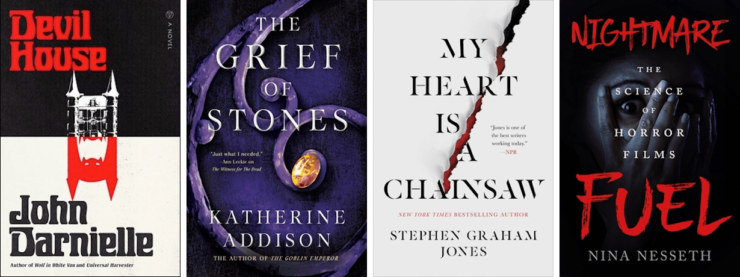
I read a lot this year, but somehow the majority of my reading was… rock biographies? I’m looking back over my list and I’m honestly not sure how that happened. But! I finally got to T.J. Klune’s House in the Cerulean Sea, which is like if a hug was a book. I guess that kind of counterbalances reading Please Kill Me in a rush one afternoon.
Four more recent SFFH books that stood out for me this year: first up is John Darnielle’s Devil House, a heartbreaking deconstruction of the true crime genre that plays with all the metal and horror tropes that fans of the Mountain Goats would expect. This book builds on all the promise of Wolf in White Van and Universal Harvester, giving us a cast of loveable misfit teens, an extremely meta true crime novelist, a porn shop-turned-home-turned crime scene, and a pitch-black meditation on how the true crime subgenre monetizes pain.
If you want your murders a little more fantastical, allow me to recommend Grief of Stones, Katherine Addison’s latest follow-up to The Goblin Emperor. This time out her Elven Detective/Hot Priest Mer Thara Celehar has to investigate a series of crimes that likely go all the way to the top! And just as in his prior adventure, The Witness for the Dead, he encounters a genuinely bone-chilling supernatural creature in one of the scariest sequences I read all year.
And speaking of chilled bones: I’d be remiss if I didn’t shout out Stephen Graham Jones’ My Heart is a Chainsaw (2021). A love letter to slashers, yes, but even more important, it’s a love letter to lost girls, outcasts, horror chicks, and all of us who clawed our way out of graves to create lives that we sometimes, cautiously, enjoy living.
And as long as we’re talking about horror fans, have you read Nina Nesseth’s Nightmare Fuel? It’s a fantastic dive into the neurology of why and how horror works, and in addition to being a fun read for fans of the genre, it might help the more easily frightened among you conquer your fear and enjoy scary movies.
–Leah Schnelbach
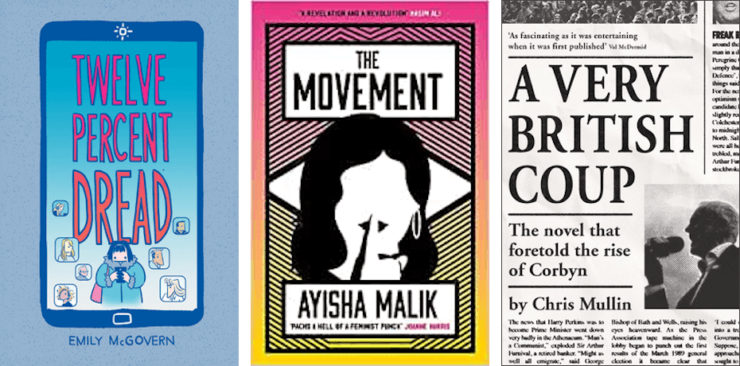
Emily McGovern’s Twelve Percent Dread is a graphic novel featuring a pair of down-on-the-luck Londoners in a sort of alt-present version of the city. They’re navigating relationships (or lack thereof), jobs (or lack thereof), rent payments (or lack thereof), jobs (or… you get it) and crushing feelings of inadequacy. The latter is not helped by the all-encompassing presence of the social media monolith that is Arko. Although, as it turns out, Arko has problems of its own… It is laugh out loud funny and occasionally a bit teary-eyed. As well as being smart and witty SF, Twelve Percent Dread is also brilliant insight into what it means to be a Londoner in the year 2022 (or thereabouts).
Ayisha Malik’s The Movement is also built on an understanding of what social media adds—or removes—from human society. When Sara chooses to go quiet as a form of personal rebellion to the shoutiness of the world, she inspires something unexpected: a global groundswell of silence as a form of protest. Malik has been gleefully subverting different genres for her career, and I’m delighted at her first work of speculative fiction. It is punchy and heart-felt and, for a book about silence, has a lot to say.
And one old-but-very-relevant recommendation: Chris Mullins’ A Very British Coup was first published in 1982. It posited the rise of a populist Labour government, led by union activist Harry Perkins, and, using that as its premise, looked at how the capital-e-Establishment would push back against that sort of thing. The aristocracy, civil service, American government, IMF, and the media all conspire as unlikely (and unlikeable) bedfellows. Coup is a proto-conspiracy theory, as you can see the elements of modern ‘deep state’ thinking in it. It is also oft-cited (especially after the brief rise of Jeremy Corbyn), although it is—if anything—is too optimistic about the standards of modern political discourse. Part political thriller, part dystopia, A Very British Coup is an essential and fascinating alt-history that, forty years on, is still prescient enough to be part of the conversation.
–Jared Shurin
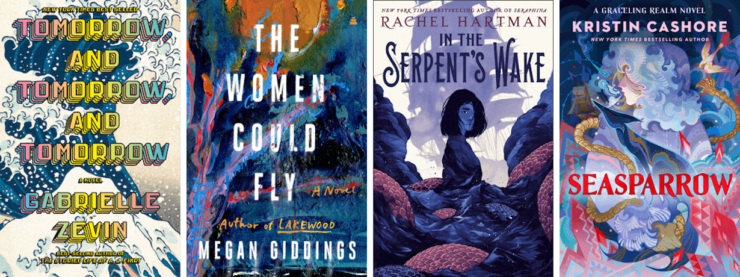
I’m positively obsessed with Gabrielle Zevin’s Tomorrow, and Tomorrow, and Tomorrow, which isn’t technically SFF yet feels like SFF. The tale of Sadie and Sam, two best-friend videogame designers, covers their decades of collaboration and conflict; nestled into their story are the stories of the games they make. The games are about lost children, small towns, grief, loss, fear, pain, love. The games are how they communicate, how they hand their innermost hearts and feelings to each other even when their friendship is on the rocks. The games feel like fantasy; their creation feels like science fiction, emphasis on (computer) science; the whole of the book will speak to anyone who’s ever lost themselves in a world just a few steps over from ours.
Megan Giddings’ The Women Could Fly blew me away for a lot of reasons, but the one I keep thinking about is how deeply Giddings infuses her novel with a sense of place—how her hidden island of witches feels real, feels like dry trees and damp beaches; how this isn’t a story that you could easily transpose to another location. It has to take place where it takes place; it reflects the way our surroundings shape each of our stories, even if sometimes in small, barely noticed ways. It’s also a rich and heartbreaking story about women, power, oppression, and community—about how we can’t work magic alone.
Rachel Hartman’s In the Serpent’s Wake, the sequel to Tess of the Road, is a seagoing voyage for Tess, who let her own feet lead her to a lot of self-discovery in her first adventure. Serpent’s Wake is a different sort of book, one about coming to grips with the world around you. It’s wise, compassionate, and deeply anti-colonialist.
Kristin Cashore’s Seasparrow tells at last the story of Hava, who (like just about every character in Cashore’s Graceling Realm series) had a deeply traumatic upbringing—one that led to her essentially raising herself from the age of 8. On the long journey back from a distant nation, Hava begins to come to terms with how her past has shaped who she is—and begins to think about who she wants to become. It sounds simple, and yet in Cashore’s wise and empathetic telling, it is harrowing, heartbreaking, necessary work.
–Molly Templeton
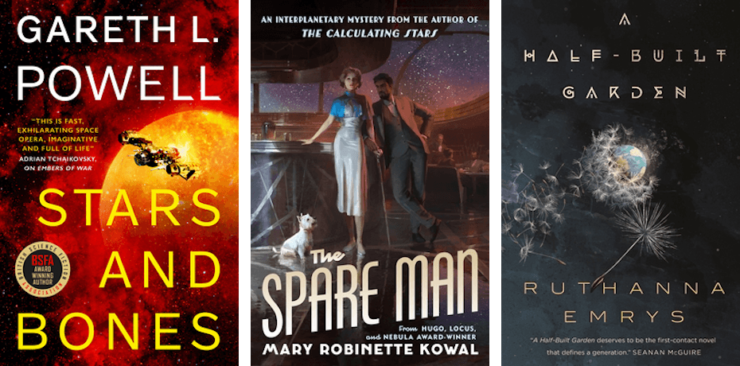
There was an interesting theme to my favorite reads of 2022—they are all science fiction, with strong elements of interplanetary and interstellar travel.
First up is Gareth Powell’s Stars and Bones, which I reviewed here at Tor.com. Powell has taken the strengths he developed in his Embers of War series, and amped up his skills at characterization and character relationships with a somewhat elegiac story of the diaspora of humanity, forever cut off from Earth in the gilded cages of their wandering interstellar arks. And although it’s the first novel in a series, it tells a complete and satisfying story.
The Spare Man, Mary Robinette Kowal’s love letter to The Thin Man stories, is set on a glitzy, ritzy and somewhat improbable interplanetary cruise ship. Kowal gives us a dynamic heroine, her husband, and her very good dog, along with fizzy and sparkling dialogue, banter—and a murder mystery. In spaaace!
To round out my picks is A Half Built Garden by Ruthanna Emrys. It’s a novel about trying to fix a broken Earth, the viability of doing so, and humanity’s first contact with aliens who have opinions about our ability to fix our own mess. Emrys—author of the Innsmouth Legacy, a well crafted cozy cosmic horror series—poses questions relevant to today, from climate change to the ways we build societies, all through the lens of a wildly ambitious story with a richly imagined future and intriguing aliens.
–Paul Weimer
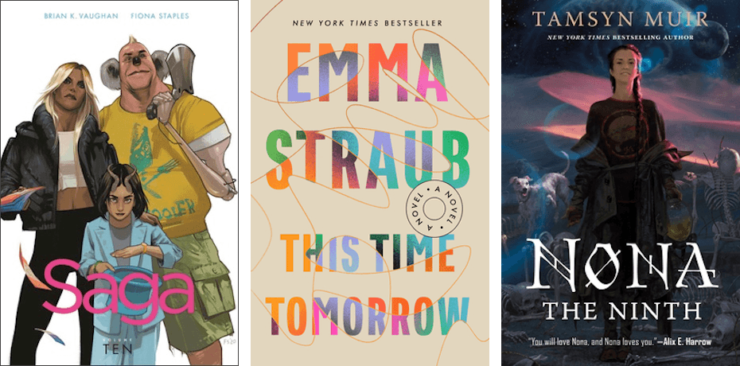
I had a baby late last year, so I’ve spent many a bottle feed with a book (or more often ereader) propped in my other hand. The books that most stuck with me balanced the grief of impending loss with the impossibility of discovering new memories or connections. Considering we call our kid “skish,” my first pick for best book can’t be anything but…
Brian K. Vaughan and Fiona Staples’ space fantasy comic Saga returned in January after a four-year hiatus, but I waited until Volume 10 to read because I wanted to immerse myself back in that universe all at once (and reread!). Of course it all hit differently, especially the final moments between Marko’s father and baby Hazel. The start of this new arc isn’t as explosive as past ones, though it’s got excellent Firefly vibes with Hazel’s blended family cautiously negotiating with a band of space pirates. Yet it’s just as gutting, demonstrating how grief makes us cut off parts of ourselves in order to grow in directions we hadn’t anticipated.
I was cautiously optimistic for how litfic author Emma Straub would tackle time travel in This Time Tomorrow, about a forty-year-old woman who gets to relive her sixteenth birthday—not for the sake of some boy, but to get more time with her ailing father. This pensive, wry novel doesn’t overdo it on subgenre tropes, committing to a straightforward version of time travel that nonetheless unraveled me, immensely moved by the love between a parent and child who would both shorten and lengthen their time together.
And while Nona the Ninth was a tone adjustment between what Locked Tomb fans would expect after Harrow and before Alecto, it found a delightful new way to play with dramatic irony (which I got to talk with Tamsyn Muir about!). Just when I thought I had had my fill of Nona’s naïveté, the final moments had me sobbing over a birthday present.
My son has since figured out swiping screens and turning pages, so I’ve been unable to do my usual end-of-year catch-up on all the novels I started for various work or fun reasons. There are a bunch of books I never got the chance to finish this year, any of which I imagine would have been mentioned above. So, shout-outs to H.A. Clarke’s The Scratch Daughters, Holly Black’s Book of Night, and the unintentional duet of Alex White’s August Kitko and the Mechas from Space with Neon Yang’s The Genesis of Misery.
–Natalie Zutter


